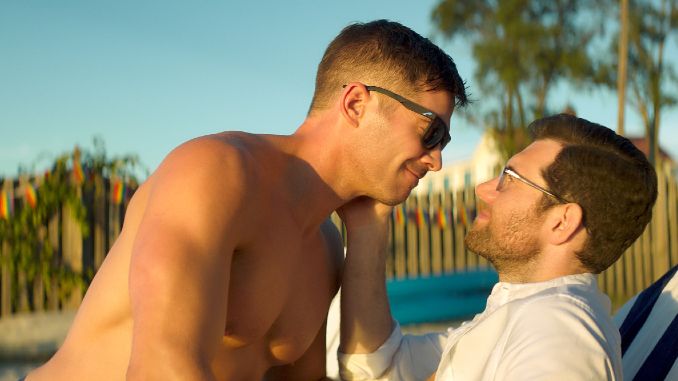Bros Bravely Blazes a Trail Towards Convention

Queer cinemagoers have learned to feed on scraps, to make subtext their text, to read in the dark. As those skills, honed as a facet of the rest of queer life, deteriorate in the face of increased acceptance (and the lucrative assimilation that so often follows), they are confronted by pieces of liminal queer pop. These are caught between the righteous anger at mainstream closeting and the unbridled excitement of finally getting to be the lines rather than the spaces between. This friction needs generous lubing up in Bros, the gay rom-com between two hot white men that’s identity politics are sometimes as limiting as its own genre-boxed grandiosity. There is a kind of progress when a gay romance has studio-level money behind it, but the concessions and compromises its R-rated comedy makes to the straights and squares out there in order to seek profit is dispiriting—more so because of the fresh slice-of-gay-life gags it does tout so proudly. Bros says many of the right things, often loudly and directly, as it reblazes an already well-marked trail towards normative convention.
Star, co-writer and executive producer Billy Eichner plays grouchy podcast host Bobby, whose queer history lessons get him a gig running a museum. You gotta be an influencer if you want to get anywhere in this world, right? His fame also breaks the ice in a club conversation with lawyer-hunk Aaron (Luke Macfarlane). The pair strike up an opposites-attract relationship, even if that last word scares both stereotypical commitmentphobes, and like the birds and the bees, tropes soon follow.
Aaron is deeper than he seems. Both men have a lot to learn, which can blow up in their faces when lightly confronting “we accept you, but only when you’re quiet about all that gay stuff” parents and Masc4Masc self-loathing. There’s a happily ever after awaiting, offering the safe monogamous bliss the movie itself condescendingly critiques in its jabs at Hallmark’s heteronormative gay holiday movies.
Bros is intent not only on its goal—putting historically sidelined and best-friended queer people, most of whom are sidelined and best-friended here, front-and-center in a factory-issue rom-com—but on us understanding the importance of its goal. By virtue of his job, Bobby starts multiple speeches by harkening back to antiquity, looking back millenia at all the ways queerness has been stifled, ignored, overwritten. A final sequence, the kind of musical number that happens in comedies when the writers remember that endings are hard but dancing curtain-calls are easy, climaxes in a spectacular smooch, juxtaposed against hieroglyphs of Khnumhotep and Niankhkhnum doing much the same 2500 years ago. It’s one of the only shots that says anything with the camera, and what it says is as clear as all of Bobby’s on-the-nose soliloquies: Don’t worry everyone, Bros made it for us all.
Like a CrossFit gay Atlas, Eichner and his film—helmed and co-written by perhaps the only (straight) director of Hollywood comedies that still has enough purchase to get them into theaters, Nicholas Stoller—shoulder immeasurable burdens. It was hard enough to sell this movie to the studio, something Bobby reenacts in a self-referential flashback, and it’s not hard to glean that one of the reasons Universal said yes was that Bros could be Important on top of Funny. But all the filmmakers had to do to make it work was what they were good at.
-

- Curated Home Page Articles By Test Admin October 21, 2025 | 3:10pm
-

- Curated Home Page Articles By Test Admin October 21, 2025 | 2:57pm
- Urls By Test Admin October 21, 2025 | 2:57pm
- Curated Home Page Articles By Test Admin October 21, 2025 | 2:55pm
-

-

-

-

-

-

-

-

-

-

-

-

-

-

-

-

-

-

-

-

-

-

-

-

-

-

-

-

-

-

-

-

-

-




































